Reshape Europe
Reshape Europe Conference: ‘Building Resilience, Ensuring Stability, Harnessing Welfare’
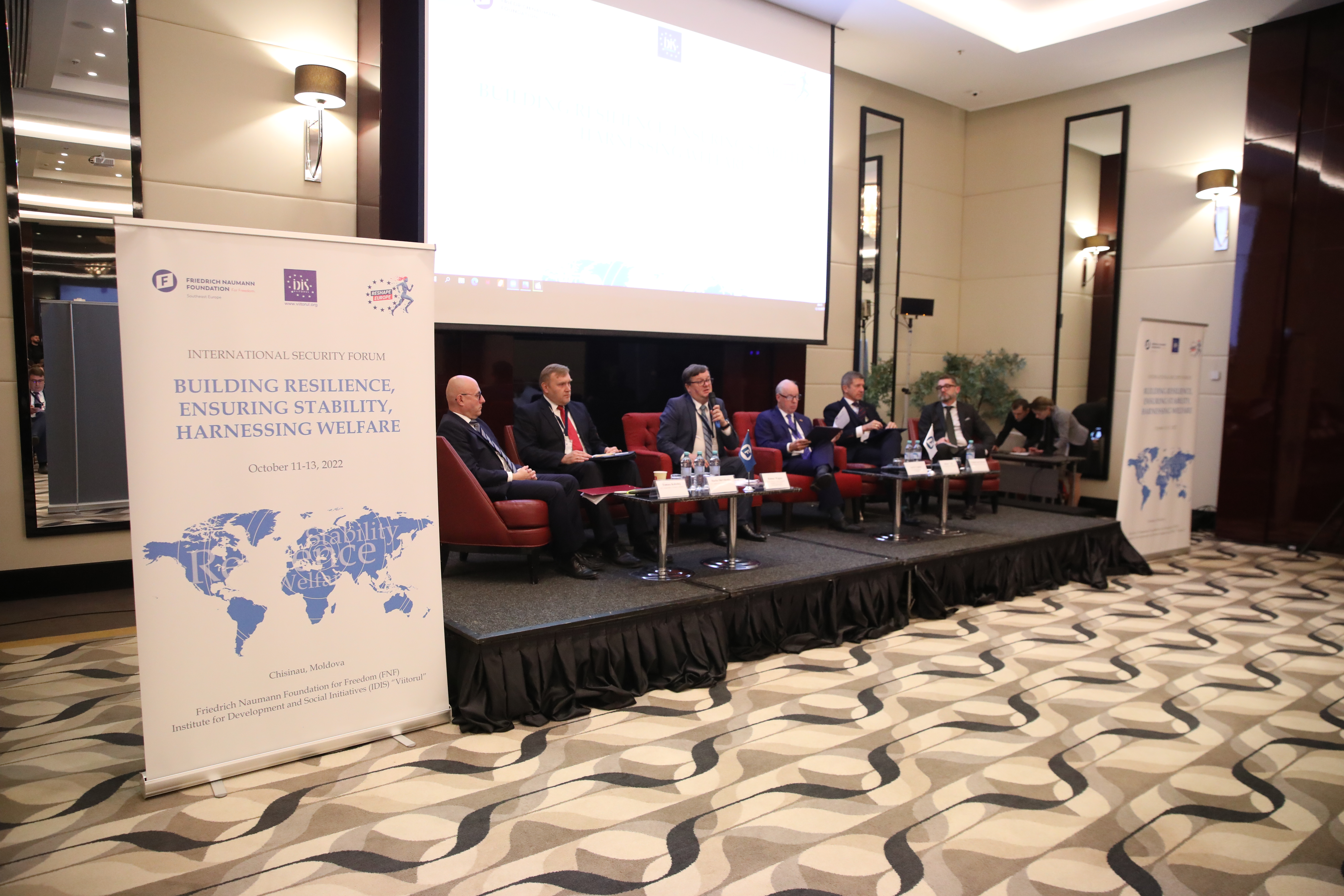
The International Security Forum ‘Building Resilience, Ensuring Stability, Harnessing Welfare’ focused on Ukraine's resistance to Russian aggression, military and security challenges in Eastern Europe, potential assistance to Moldova in the joint effort to resist Russian aggression in Ukraine, building economic and institutional resilience and building energy security in Eastern Europe.
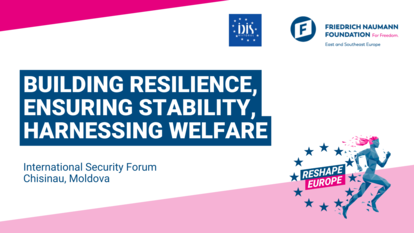
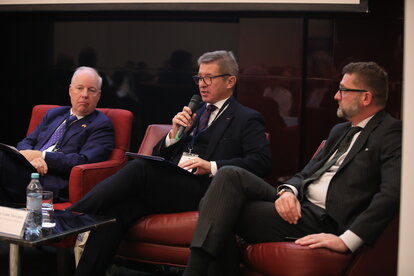
"We need to have a clear vision and strategic thinking. Moldova, together with its strategic allies, Ukrainian, Romanian, Polish and Baltic partners, must enter a new era, more protected against various threats."
The first session brought together ambassadors to the Republic of Moldova from Ukraine, the USA, Romania, the UK and Poland. Among the speeches, we would like to highlight the statements of the Ukrainian Ambassador Marko Shevchenko, who, commenting on the events in Ukraine, said, among other things: ‘No Russian victory can be achieved without the use of propaganda. Russia had military victories only in those regions where people watch Russian television channels or listen to Russian radio stations, read Russian newspapers, go to Russian churches. Propaganda has become the Kremlin's most effective weapon, both in Russia and internationally. Unless effective measures are taken to eliminate this propaganda, defeating the Kremlin will be impossible. In Ukraine, the situation started to improve only after Russian TV channels, social networks and media were completely banned.’ At the same time, US Ambassador Kent Logsdon praised the attitude of Moldovan authorities and society in relation to the war in Ukraine: ‘I think it's important to recognize Moldova's strong, public stance in condemning Russia for violating international norms and joining the international community and the UN in holding Russia accountable for its actions (...) Moldova has shown the world that solidarity, not isolation, is the key to prosperity.’ The American diplomat also spoke in positive terms about the Moldovan state's intentions to reform and strengthen its military and national security sector, declaring his country's support in this process. ‘We firmly believe that the Republic of Moldova is on the right track, and its efforts to fully embrace democracy, promote a strong market economy, counter corruption and build a modern military to defend its neutrality are steps that will lead to a resilient and stable society, fully anchored in the European Union and the free world. And I think this is the lesson we can all learn from the attitude of the Republic of Moldova towards this terrible war,’ the U.S. ambassador concluded.
"Propaganda has become the Kremlin's most effective weapon, both in Russia and internationally."
The second session was honoured with the presence of renowned experts such as Adam Eberhardt, vice-president of the think-tank Warsaw Enterprise Institute (Poland), Oleksiy Melnik, co-director of the Razumkov Centre from Kiev (Ukraine), Denis Cenușă, EESC associate expert, Nino Evgenidze, director of the Economic Policy Research Center NGO from Tbilisi (Georgia) and Dan Dungaciu, director of the Institute of Political Science and International Relations of the Romanian Academy. Adam Eberhardt underlined the need for courageous decisions to support the process of generating public policies, highlighting as an example the joint declaration of the Central and Eastern European Heads of State on 26 February, which called for the granting of EU candidate country status to Ukraine, which happened very shortly afterwards, and included the Republic of Moldova. The expert believes that Russia's war against Ukraine is also a war against Europe. Thus, in his view, attempts to cave in to Putin in order to get concessions from him will result in greater pressure from Russia against the entire Western world. ‘What we need to do is to stick together, to continue to support Ukraine with military equipment, with political will. We need to turn Ukraine into a strong part of the Euro-Atlantic community capable of resisting aggression. And when we help Ukraine, we must not forget Moldova,’ concluded Adam Eberhardt, who is also the special representative of the Polish government in Moldova and is working to increase Polish development assistance.
"What we need to do is to stick together, to continue to support Ukraine with military equipment, with political will. We need to turn Ukraine into a strong part of the Euro-Atlantic community capable of resisting aggression."
Professor Dan Dungaciu argued why Russia, in his opinion, should be excluded from the ‘5+2’ negotiating format dedicated to the settlement of the Transnistrian conflict in Moldova. Thus, with the emergence of the Yermak-Rassmusen position document, officially endorsed by Ukraine, a new approach to regional security in Eastern Europe begins to take shape, in which the automatic inclusion of Russia as a discussion and negotiation partner in all settlement formats, including the Transnistrian one, is abandoned. The aim is to settle the region's security issues without Russia, which is no longer seen as a reliable partner due to its own behaviour from 24 February 2022 onwards. In this vein, once Ukraine no longer accepts Russia as a partner and mediator, it is very unlikely that the Transnistrian settlement talks will be able to move forward with Russia as a ‘guarantor’.
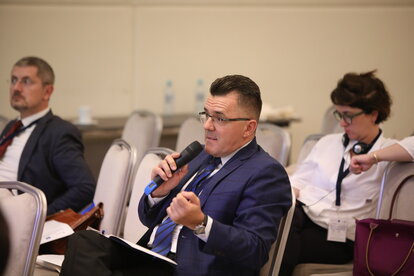
In the third session of the Forum, the audience was addressed by prominent personalities in European politics, such as Kira Rudik, member of the Ukrainian Parliament, leader of the Holos party and vice-president of ALDE party, Dan Barna, vice-president of the Save Romania Union party and of the Chamber of Deputies in Bucharest, as well as security experts such as the former Minister of Internal Affairs of the Republic of Moldova, General (retired) Victor Catană, and the representative of the New Strategy Center think-tank from Romania, Brigadier General (retired) Eduard Simion.
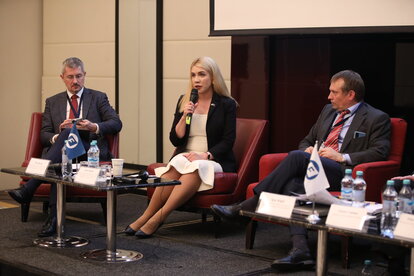
Kira Rudik stressed that Ukraine's fight against the Russian invasion is for its own sovereignty and the values to which it adheres, and for the right to exist and live peacefully in its own country: ‘There are some lessons I have learned in the last eight months, and I want to share them with you. The first lesson is unity. I think if there is one good thing that comes out of this war, it is that in every country I go to, the politicians there will tell me: we have internal differences, but on one issue we are united: supporting Ukraine, protecting it and remembering the European values we stand for. The war that Putin has started against us is in fact a reminder that freedom is not for free, that the fight for freedom is not over as long as there is tyranny in the world. The second lesson I learned is that dictators can never be pleased. The war in Ukraine began not on 24 February, but eight years ago, when Putin illegally annexed Crimea and our eastern territories. And everyone hoped that this issue could be covered up so that it would go away. It didn't. (...) We should remember this lesson when we ask ourselves whether peace is possible. Peace is only possible when there are security guarantees that evil is not going to attack again. The third lesson is that we cannot make our children fight in this war. That is why we, our generation, will fight to the end. We took this oath at the beginning of the war and we will keep it. Our plan in Ukraine is simple: we will fight and we will continue to need international help, in particular three specific things. First and most important – weapons. Secondly – money. Ukraine's budget hole is USD 5 billion a month, while European countries pay USD 1 billion a day to Russia for energy resources. The Ukrainian economy is in shambles at the moment, which is why we need this money from our allies. And the third thing – sanctions.’
"In every country I go to, the politicians there will tell me: we have internal differences, but on one issue we are united: supporting Ukraine, protecting it and remembering the European values we stand for."
In his speech, Dan Barna said that Vladimir Putin's stake was that Europe would fail the solidarity test, as the war against Ukraine represents the first major security challenge for the European Union project, for the viability and resilience of the European Union. ‘The fact that the EU has managed to build solidarity in such a short time, that this solidarity exists, is extraordinary,’ said the Romanian MP. ‘I know that there are many voices, some paid by the Russian Federation, claiming that the European Union is coming to an end as a project. I don't think that's true,’ he added. The politician stressed that at this historical moment for our part of Europe, neutrality towards what is happening in Ukraine is impossible and a position must be taken. In his view, this position rules out the idea of caving in to Putin for the sake of an illusory peace, which the Kremlin would break again whenever it wanted. Dan Barna also referred to the Eastern Partnership, mentioning that it has three firm members: Ukraine, the Republic of Moldova and Georgia, despite the fact that institutionally, the current realities have made it no longer functional. But that format has set the three countries on a path that all EU member states must follow.
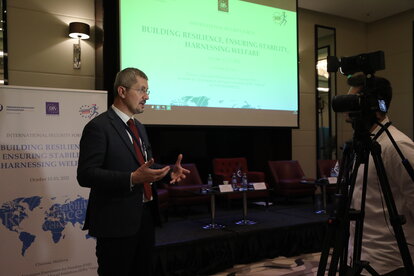
The fourth session of the Forum focused on the subject of effective state-building and how resilience can be built in a time of severe economic turmoil and brutal military aggression in our immediate neighbourhood. This session was addressed by Smaranda Miron, representative of the EU Energy Community Secretariat, Tinatin Akhvlediani, researcher at CEPS’ Foreign Policy Unit, Roman Nitsovych, research director at DiXi Group (Ukraine), Ana Otilia Nuțu, energy expert at Expert Forum (Romania), and Victor Parlicov, energy expert and former director of ANRE (Republic of Moldova).
"Peace is only possible when there are security guarantees that evil is not going to attack again."
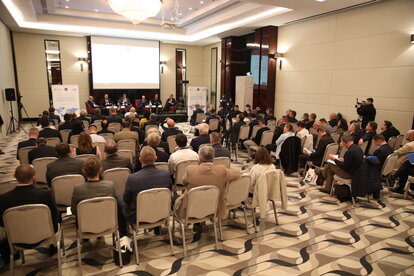
"The war that Putin has started against us is in fact a reminder that freedom is not for free, that the fight for freedom is not over as long as there is tyranny in the world."
Speaking about the energy aspect of the unprecedented crisis facing Europe, Smaranda Miron pointed out that for the first time energy is being used as a weapon in a military conflict, and, even more, as a tool to counter a coordinated international response to the military conflict taking place. ‘On 24 February, Russia's military invaded Ukraine, and since then it has deliberately targeted energy production plants and the energy transmission network in an attempt to paralyse Ukrainian society and render reconstruction and rehabilitation efforts futile,’ she said. Speaking about the situation created in our country, the expert said, ‘In my opinion, the energy sector of the Republic of Moldova is a perfect example of invasive Russian domination. Russia is still Moldova's main gas supplier and the Russian gas feeds a power plant from Transnistria, which has a dominant position in the Moldovan energy market for a simple reason: it does not pay for the gas it uses to produce electricity, so its prices are unbeatable. No other producer, local or foreign, can compete with the dumping prices of Moldavskaya GRES. As long as this situation persists, there will be no real competition on the electricity market of the Republic of Moldova, and no other producer will be able to take the place of this plant and break the chain of dependence on Russian gas. (...) When it comes to the current energy crisis, we can mitigate its effects, but we need to learn from it in order to be prepared for future crises. For a start, we need to invest in new capacities, as we should never again be in a situation where a single, market-dominant supplier dictates the rules. Every kilowatt-hour fed into the grid from renewables is one less coming from the Russian pipeline. We also need to invest in storage capacities. The prices for energy resources must never again be controlled by Gazprom. To achieve these things, we need better government policies. To have them, we need to build a framework based on four pillars: strong and competent institutions, legislation that ensures stability beyond political changes, an independent judiciary, and consumer education.’
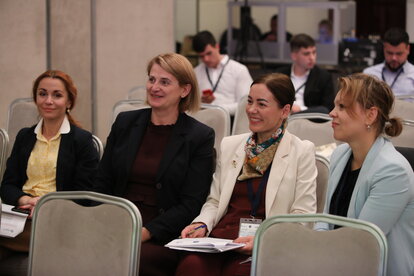
Ukrainian expert Roman Nytsovich gave an exhaustive description of the major damage that the Russian armed attacks on Ukraine's energy and basic goods supply networks have caused and are causing, listing also the needs the country will have to prepare for a very difficult cold season. At the same time, he came up with a broader message, useful not only for Ukraine, but for the whole region, ‘Some of the lessons we can learn from these experiences for our long-term resilience are: firstly, diversification of supply. Those who invest will get the benefits. Look at Germany's dependence on Russian gas and at Poland, which has already started receiving Norwegian gas through the Baltic Pipeline in addition to its operational liquefied natural gas terminal. Secondly, interconnectivity. We are seeing the benefits of synchronising the Ukrainian and Moldovan electricity system with the European electricity grid. We see the benefits of the gas interconnectors between Poland and Slovakia, between Greece and Bulgaria. The more high-capacity interconnectors, the better for organising energy flows when needed. Thirdly, decentralisation and decarbonisation. As the attacks on Ukraine show, a network of smaller power plants generating electricity and heat is less vulnerable than several larger plants. Thus, reconstruction efforts must also focus on renewable energy sources, such as biomass, which, on a national scale, would make any country less dependent on fossil resources from autocrats. So the Green Deal and the implementation of these solutions is a win-win for both the climate and long-term energy security. And last but not least, solidarity. Whether we are talking about joint gas purchases or imposing a price cap on Russian gas or oil products, the spirit of solidarity must be preserved,’ the analyst concluded.
The Reshape Europe Conference, organised by the Friedrich Naumann Foundation and IDIS Viitorul, took place in Chisinau in October 2022.
The final remarks at the end of the Forum were delivered by IDIS Director Igor Munteanu, who stressed the need for transformation, which he said will take some time, but in the end the whole world will be in a better position. ‘We have to support Ukraine, so that it will be victorious in this war. As you have seen over the four sessions, there is a constant need for public education and engagement. In the Republic of Moldova, we talked very little about security issues. We thought that neutrality would protect us, that it would solve problems by itself. On the contrary, neutrality creates more confusion – we should be aware of this, and we need to have a clear vision and strategic thinking. Moldova, together with its strategic allies, Ukrainian, Romanian, Polish and Baltic partners, must enter a new era, more protected against various threats,’ concluded Igor Munteanu.
